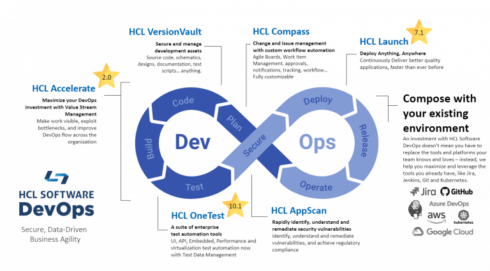
HCL Software expanded its software DevOps team and product portfolio with the releases of three major tools: HCL Accelerate 2.0, HCL Launch 7.1, and HCL OneTest 10.1.
“Digital transformation investments are really accelerating and companies are doubling down here. We see a whole slew of investment in collaboration security tools but Agile, IT, delivery, and DevOps are still top of the list and very relevant to keeping your business thriving during this changing time,“ said Brian Muskoff, the director of DevOps Strategy at HCL Software DevOps.
The first update, Accelerate 2.0, is the company’s value stream management platform that improves throughput while identifying bottlenecks and unifying data from across the organization. Release teams can move to more frequent releases with self-service tools, including templates and automated controls, according to the company.
Accelerate 2.0, which is a rebranding of HCL UrbanCode Velocity, includes a new DevOps query language that allows users to model their value stream and to see the cycle time for each stage. It’s also tool-agnostic and sits on top of the existing DevOps toolsets. The new “swim lanes” view lets users see who is working on each item in an organization’s value stream.
“When we look at what’s next, we believe value stream management really enables companies to make this leap to have software delivery as an ongoing core business process,” Muskoff said. “VSM is not a new concept; it’s been a staple of lean for decades, but it’s an emerging concept for our space – software delivery, and it’s an excellent framework for navigating a software- driven transformation.”
Another major release, HCL Launch 7.1, is the company’s continuous delivery platform that was called HCL UrbanCode Deploy in previous versions. The new release includes updates in flexibility, governance and security.
“The new features are tailored to help you modernize your continuous delivery with features that facilitate automation of deployments to development environments and allow deployments to first reach out to your change management systems to determine if they should proceed,” Hayden Schmackpfeffer, senior developer at HCL Software, wrote in a blog post. “This update expands our support of enterprise-grade needs so you can architect for the future and continue your digital transformation journey.”
A new feature, External Approvals Processes, will run immediately before a deployment and the success or failure will determine if the proceeding deployment is permitted to execute.
Also, with the addition of deployment triggers, development environments can be configured to get the latest build artifacts deployed as soon as they are received by the Launch server.
The Launch server, agent, and relay now support the Kubernetes operator model – making it easier to deploy, run, and manage each component of HCL Launch, according to HCL Software.
The third major product, HCL OneTest 10.1, enables testers to take automation all the way from mainframe terminals with 3270 interfaces, through various responsive web applications.
The testing solution supports scripting options in Java, VB.NET and Storyboard and supports all of the major web browsers. Users can create realistic workloads on their systems, track SLAs, and analyze the root causes of issues.
“It’s one thing to be able to execute large test suites and run thousands of different test suites but at the end of the day we want to find what failed quickly and get that fast feedback to get it over to the development teams to get it fixed. We’re always looking to be pluggable as an API-first organization,” said Steve Boone, the head of product management at HCL SOftware Devops. “We’re building out our APIs to make sure that they’re easily extendable and that our end users are able to build the integrations that they need and care about in this platform.”
Users can also add on automated application security testing and management with HCL Appscan.
The Software DevOps portfolio also includes HCL Compass – which handles workflow, change, and issue management – HCL VersionVault for configuration management. Real-time systems and IoT software modelling is available through HCL RTist.
“The HCL Software DevOps portfolio is your one-stop DevOps shop, providing you with the tools you need to achieve business agility. Our mission is to enable you to transform your business by providing actionable insights based on speed to market, operational cost, and with risk,” the company wrote in a post. “An investment in HCL Software doesn’t mean you have to replace the tools and platforms your team know and love. Instead, we help you maximize and leverage the tools you already have, like Jira, Jenkins, Git, and Kubernetes.”
HCL Software is providing workshops in which DevOps experts offer their take on DevOps culture and practices, tailored to your organization. Workshops can be requested here.






